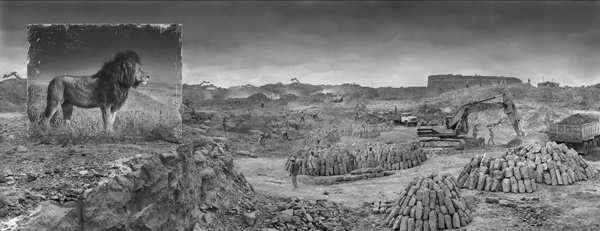"Inherit the dust"
Nick Brandt

Blue Lotus Gallery
G/F 28 Pound Lane, Sheung Wan Hong Kong.
T 852 5590 3229


13 March > 22 April, 2020

In a series of photographic panoramas shot in East Africa, celebrated photographer Nick Brandt records the impact of men in places where animals used to roam, but no longer do. Pollution and urban encroachment is the cause of ever decreasing habitat for the natural world and loss of biodiversity.
Consumption of wildlife as deluxe delicacies, grounded into medicines or carved into luxury objects have pushed many species such as rhinos and pangolins to the brink of extinction, "Very few ecosystems are not affected by wildlife trade," said Vincent Nijman, an anthropologist at Oxford Brookes University in Britain. "It directly impacts a very large number of species, and has a knock-on effect on many more species still."
And its not just animals that are affected, wildlife trade comes at a huge cost to humanity too. Currently wildlife trade is the cause of a major global health scare. The most novel strain of corona virus seems to have originated from a wildlife market in Wuhan. Over 1000 people died already. The Chinese government ordered a ban on the trade of wild animals but only temporary until the epidemic is over. Activists, scientists and conservationists are pushing for a permanent ban.
Humanity can not survive without the rich biodiversity which took the planet millions of years to create; together they prosper and together they will fall. The world can not allow a minority of exotic food lovers to be the cause of extinction of species, the loss of biodiversity and cause major global health emergencies.
Confucius once said: 'You end up where you are going if you don't change direction. If we don't change direction, our future generation will be inheriting dust.
This is the first time Nick Brandt's work will be exhibited in Hong Kong. The exhibition marks a pivot in Blue Lotus Gallery's program that will primarily focus on human impact on the natural world through a string of exhibitions in 2020.
Consumption of wildlife as deluxe delicacies, grounded into medicines or carved into luxury objects have pushed many species such as rhinos and pangolins to the brink of extinction, "Very few ecosystems are not affected by wildlife trade," said Vincent Nijman, an anthropologist at Oxford Brookes University in Britain. "It directly impacts a very large number of species, and has a knock-on effect on many more species still."
And its not just animals that are affected, wildlife trade comes at a huge cost to humanity too. Currently wildlife trade is the cause of a major global health scare. The most novel strain of corona virus seems to have originated from a wildlife market in Wuhan. Over 1000 people died already. The Chinese government ordered a ban on the trade of wild animals but only temporary until the epidemic is over. Activists, scientists and conservationists are pushing for a permanent ban.
Humanity can not survive without the rich biodiversity which took the planet millions of years to create; together they prosper and together they will fall. The world can not allow a minority of exotic food lovers to be the cause of extinction of species, the loss of biodiversity and cause major global health emergencies.
Confucius once said: 'You end up where you are going if you don't change direction. If we don't change direction, our future generation will be inheriting dust.
This is the first time Nick Brandt's work will be exhibited in Hong Kong. The exhibition marks a pivot in Blue Lotus Gallery's program that will primarily focus on human impact on the natural world through a string of exhibitions in 2020.
 |
Nick Brandt |
opening cocktail :
Thursday 12 March (RSVP please)
mpefm
HONG KONG art press release
Opening hours :
Wednesday - Sunday 11am – 6pm.

QR of this press release








